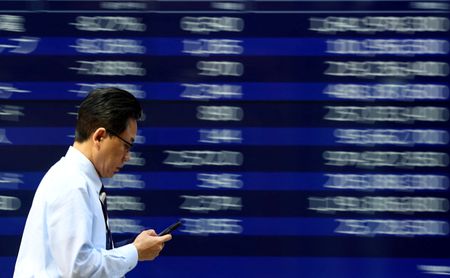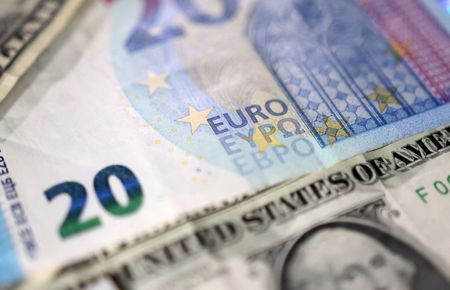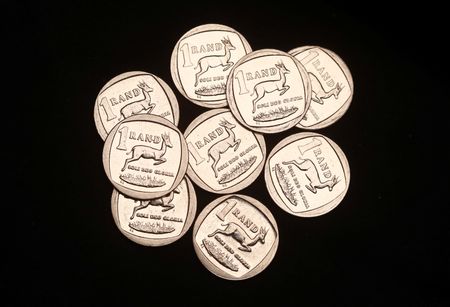By Nell Mackenzie and Wayne Cole
LONDON (Reuters) -World shares were mixed on Tuesday, as a lift from European earnings was offset by lower Asian markets, while the U.S.-EU trade deal brought home to investors the prospect that punishing tariffs might erode growth and spur inflation.
The initial relief over Europe’s 15% levy dissipated when considered against the 1% to 2% tariff the continent had faced prior to U.S. President Donald Trump taking office.
Still, European earnings helped stocks rebound on Tuesday after falling a day earlier as leaders in France and Germany lamented the trade deal outcome as potentially being a drag on growth.
Trump also flagged a “world tariff” rate of 15% to 20% on all trading partners that were not negotiating a deal, among the highest rates since the Great Depression of the 1930s.
“While the worst case scenario was averted, the implied EU tariff increase from 1% in January is a significant tax increase on EU exports,” wrote economists from JPMorgan in a note.
“This is a very big shock that unwinds a century of U.S. leadership in global free trade,” they said. “While we no longer see a U.S. recession as our baseline from this shock, the risk is still elevated at 40%.”
A further risk to world growth came from a sudden spike in oil prices after Trump threatened a new deadline of 10 or 12 days for Russia to make progress toward ending the war in Ukraine or face tougher sanctions on oil exports. [O/R]
An air of caution saw MSCI’s broadest index of world shares tick down about 0.1%.
European shares recovered after Monday’s sell-off. Europe’s broad STOXX 600 was up 0.6%, helped by some positive reactions to quarterly earnings. French and German stock indexes rose over 1%.
China stocks ended higher on Tuesday as a new round of Sino-U.S. trade talks continued while Japan’s Nikkei lost 0.8%.
The euro was flat at $1.1580, after falling 1.3% overnight in its largest drop since mid-May.
The dollar index was up at 98.714, after the rush out of short dollar positions lifted it 1% overnight, while it eased a one-week high on the yen to stand at 148.48.
Wall Street futures held firm on hopes for upbeat results from mega caps this week that include Apple, Meta Platforms, Microsoft and Amazon. [.N]
S&P 500 futures nudged up 0.2%, while Nasdaq futures added 0.4%.
Yields on 10-year Treasuries held at 4.408%, having crept higher on Monday as markets braced for another steady decision on interest rates from the Federal Reserve.
Futures imply a 97% chance the Fed will keep rates at 4.25%-4.5% at its meeting on Wednesday and reiterate concerns that tariffs will push inflation higher in the short term.
Analysts also assume one, or maybe two, Fed officials will dissent in favour of a cut and supporting wagers for a move in September.
The odds could change depending on a slew of U.S. data this week including gross domestic product for the second quarter, where growth is seen rebounding to an annualised 2.4%, after a 0.5% contraction in the first quarter.
Figures on job openings are due later on Tuesday that will help refine forecasts for the crucial payrolls report on Friday.
“The equity rally has narrowed, valuations are stretched, and market internals are flashing caution, and consumer data—particularly around housing and retail—show signs of fatigue,” said Bruno Schneller, managing director at Erlen Capital Management, Zurich.
“This is the start of a ‘show-me’ phase—for both policymakers and cooperates. Markets will demand confirmation: from earnings, from macro, and from the Fed,” Erlen added.
Canada’s central bank also meets on Wednesday and again is widely expected to hold rates at 2.75%.
In commodity markets, prices for copper and iron ore were under pressure while gold was up roughly 0.3% at $3,324 an ounce. [GOL/]
Brent climbed over 30 cents to $70.37 a barrel, while U.S. crude gained over 40 cents to $67.14.
(Editing by Sam Holmes and Bernadette Baum)









